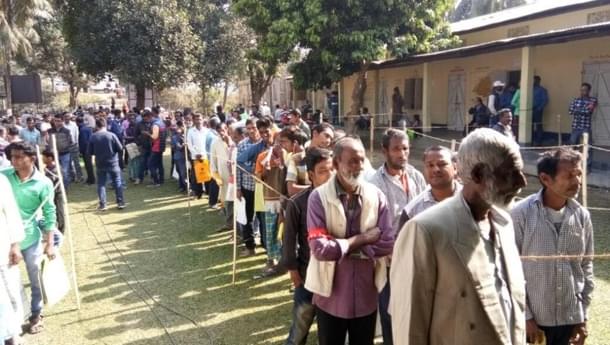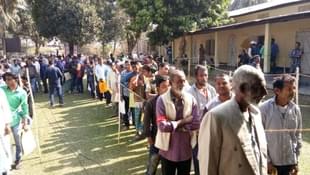Politics
Prospect Of Deporting Illegal Bangladeshi Migrants Is Slim; Issuing Work Permits May Be Better
Jaideep Mazumdar
Apr 14, 2018, 08:37 PM | Updated 08:37 PM IST
Save & read from anywhere!
Bookmark stories for easy access on any device or the Swarajya app.


By the end of June, we will finally get to know exactly how many Bangladeshis, and their descendants, have entered Assam and are staying illegally in the state. With the Supreme Court ordering the publication of the second draft of the National Register of Citizens (NRC) by 31 May and the final draft by 30 June, there will be no room left for ambiguity on this count. And it is expected that many of the 1.39 crore people dwelling in Assam, whose names did not figure in the first draft of the NRC published on 31 December last year, will not make it to the second draft and the final list as well.
Sources in the NRC state coordinator’s office say that the ongoing scrutiny of the claims of 1.39 crore people – of the 3.29 crore applications for inclusion of names in the NRC, only 1.9 crore names were included after thorough scrutiny – have revealed that many claims are false. The scrutiny is based not only on proof of citizenship furnished by the applicants but also family legacy. Applicants have been asked to provide proof of the names of their parents or grandparents figuring in the 1951 voters list or that their forefathers were citizens of India at that time. This is turning out to be a tough provision for those of doubtful descent or citizenship.
Once the second draft is published on 30 May, those whose names do not figure in that draft would get a second chance to submit claims, while others would get a chance to file objections against those whose names figure on the second draft and who they suspect to be illegal migrants. The NRC secretariat would once again go through those claims and objections very meticulously, scrutinise all documents and cross-verify them before publishing the third draft, which will be the final NRC.
But to say that all those excluded from the final NRC, and thus deemed to be illegal Bangladeshi nationals who, or whose parents and grandparents, have surreptitiously sneaked into India, will face the grim prospect of being deported to Bangladesh, will be untrue. Because, simply speaking, the process of deportation is lengthy and cumbersome and only those that Bangladesh acknowledges to be its citizens can be deported. Since the chances of an overpopulated Bangladesh admitting that crores of its citizens had crossed over illegally into Assam over many decades, and thus taking them back, is extremely slim, there is little prospect of these ‘foreigners’ being deported.
Those who do not find their names in the final NRC will then have to be produced before any of the 100 Foreigners’ Tribunals in Assam. The Tribunal will once again scrutinise individual cases and finally declare them to be foreigners (non-Indians) or not. Once a person is declared to be a foreigner by a Tribunal, he or she will be kept at a designated ‘detention centre’ awaiting deportation. The Assam Home Department will then refer these cases to India’s External Affairs Ministry, which will then forward the names and all details of these foreigners to the Bangladesh High Commission, which will in turn pass on all the documents to the Bangladesh Home Ministry.
The Bangladesh Home Ministry will then verify if the persons declared to be Bangladeshis by Assam’s Foreigners’ Tribunals are really so. Simultaneously, Bangladeshi High Commission officials will get access to the suspected Bangladeshis in Assam’s detention camps and carry out independent investigations about their places of origin (if at all) within Bangladesh. They will send their findings to their country’s Home Ministry, which will direct the police of the respective districts to cross-check the claims. For instance, if a person in a detention center admits he hails from village ‘X’ of a certain district in Bangladesh, the police of that area will be asked to verify his claim.
But there is no guarantee that such verification and scrutiny will be carried out by Bangladesh diligently and honestly. Bangladesh will be under no compulsion to do so and would definitely avoid taking on the responsibility of more people crowding into the country. It would be safe to say that Bangladesh will reject most of the claims and would, at best, agree to the repatriation of a few hundred of its citizens only. This has happened in the past too, when Bangladesh has refused to acknowledge that many people declared to be of Bangladeshi origin by Assam’s Tribunals had migrated illegally from that country to avoid taking them back. So these people, and we are talking about lakhs of them, will remain stuck in detention camps in Assam.
Also, there is the likelihood of those whose names don’t figure in the final NRC simply disappearing. These people, facing the prospect of being eventually rounded up and herded into detention camps, will simply migrate to other parts of the country where they can easily get citizenship documents. Bengal Chief Minister Mamata Banerjee has already extended an open invitation to all those whose names don’t figure in the final NRC to migrate to Bengal and settle down there. She has promised to shelter them. If past experience is anything to go by, while a majority of these people of doubtful citizenship will settle down in Bengal, many of them will also migrate to states where they can easily get citizenship documents from minority-appeasing governments.
Which means that, at best, a few lakh Bangladeshis would remain in Assam, which will then have to bear the burden of feeding and clothing them in detention camps. The children of these illegal migrants will have to be provided education, they will have to be provided free healthcare, housing, and sanitation, and all other facilities that Indian citizens are entitled to except for the rights to vote, livelihood, movement, and freedom of expression. The Indian taxpayer would thus be paying for the upkeep of these Bangladeshi nationals who, or whose forefathers, entered Assam illegally. And since Bangladesh will refuse to acknowledge most of them as its citizens, these illegal migrants will remain India’s ‘guests’ for eternity, enjoying free food, clothing, housing, education, and medical attention!
This being the case, it would not be a bad idea to explore the option of issuing work permits to Bangladeshis as mooted by Meghalaya Chief Minister Conrad Sangma. Though Sangma’s proposal pertained to the suspected Bangladeshis residing in his state, it would make sense for Assam to also think about it. The Bangladeshis living in Assam are engaged in various vocations and form a huge pool of cheap labour in the state. Assam’s exchequer would benefit by issuing work permits against a fee to them; and the permit conditions could also entail that the permit holders give a fair share of their earnings to the state at periodic intervals just as Indian citizens do. Assam’s citizens and its various sectors would also benefit from this cheap labour. This would make much more sense than keeping lakhs of these Bangladeshis in detention camps where they will be unproductive and be quite a drain on the nation’s resources.
Also, Assam Police has to mount intensive vigil on the interstate border with Bengal to prevent those whose names do not figure in the second and then the final NRC from surreptitiously migrating to the rest of the country. This will be a tough task not only due to the physical challenges involved, but also due to the predictable opposition from Banerjee, who will fume against the alluring chances of creating more vote banks (of illegal Bangladeshis) in Bengal being thwarted. But it is a task that must be undertaken, and with help from central paramilitary forces, so that not a single illegal Bangladeshi living in Assam can sneak away to any other part of India. Only then will this entire NRC update exercise make sense.
Jaideep Mazumdar is an associate editor at Swarajya.




